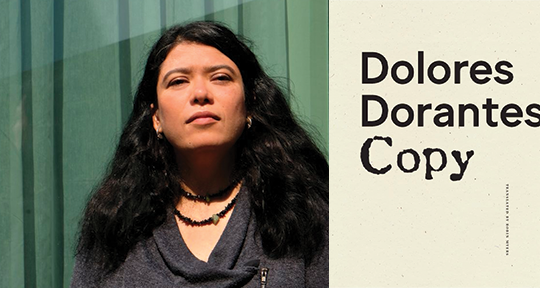Copy by Dolores Dorantes, translated from the Spanish by Robin Myers, Wave Books, 2022
This book is an object, a memento, a testimony, memory, road, destination, vessel, a circle.
Dolores Dorantes’ Copia first came out in the Netherlands as a bilingual (Spanish-Dutch) double-sided booklet titled Copia/Kopie (Publication Studio Rotterdam) in 2018, the result of Dolores’ residency at Poetry International. Three years later, it was released in Spanish under the Mexican press Mangos de Hacha, and in 2022, Copy made its way into English, translated by Robin Myers for Wave Books (US). I’ll start with a mundane statement: Copy’s nomadic nature is the result of opportunity and communion between its author and visionary translators and editors. But after reading it, experiencing it—after crossing its many borders, trying to hold its overwhelming weight, I can’t help but think that Copy’s many editions, shapes, colors, and mediums have also strengthened, confirmed, and laced its themes and motifs: migration, displacement, exile, the loss of one’s place, the loss of one’s address, the loss of one’s identity, movement, uprootedness.
Copy opens with the following line: “It gets fainter and fainter.” Quite the opposite happens. The work is unrelenting, fast-paced, filled with discomfort and existential dread. “You live because you removed yourself from your condition”; “To reassemble oneself. Proactivity, opportunism: an order. A tongue, leaving. A gesture, setting sail: a singular place.” They’re also subtle, violent, proliferate with grotesque imagery: “The soldiers plotted a safe shelter with your blood.” “The tower with its hook-mouth.”
All this to say—Copy is an experience. Dolores invites us to feel, to leave one’s skin. Discomfort, confusion, hurt, relief, and hope are found equally amidst her intricate wording, her syncopated and crushing sentences. Images and interactions emerge, but as flashes, not scenes. They seemed distorted as if one were to peek through a window or a camera lens (the poet, in fact, worked as a journalist in Ciudad Juárez, south of the Río Grande as a young adult). Put together, however, they form a vivid and accurate testimonial. The work is fortified with suspense. “You let the boot of structure advance over you thinking, scornfully: to not be.” It is decorated with absurdity. “Gentlemen, I’m going to ask you to rid yourselves of your sense of pity.” And with imagery that, at times, is devastatingly beautiful. “You live because the moon touched the stone jutting out of the pond to show you, copiously, its edges”; “Just like the petal that peeks a single tip out of the ashes.”
The poems (one might call them “micro-essays”) are blocks of text, composed of short bursts, tiny sentences, single words, and clever, percussive punctuation. The language echoes and recurs throughout the text, similar to the structure of a ranging song, an incantation; in other words, there’s a lot of copying. In an essay Dolores wrote in 2016 for the Mexican literary magazine Tierra Adentro, she said she had “spent a long time trying to understand how reality manifests itself through copying processes.” She goes on to divulge (after revealing a bit of her experience as a refugee author in the US) that her personal experience has shown her “wonderful revelations” about “the copying processes, reproduction, and the construction of structures of thought.” Is Copy the result of those “wonderful revelations”?
I like to think of the poems and their fractured sentences as evidences of memory and its various permutations, true to Dorantes’ fixation with replications and semblances. Copy seems like a study of memory’s assembly, its deconstruction and shattering, its reconstruction—based on fragments, sounds, smells, faint and blurry images. This reconstruction, however, is perhaps better defined as the betrayal of memory, an anti-memory. The recollections encapsuled in Copy are but assumptions, notions, hunches, so vague and shapeless and indiscernible as to be unrecognizable. Instead of an answer, Copy’s images and scenes are questions.
Dorantes’ “memory” is not whole; it resembles the act of remembering, it’s messy, anachronistic, contradictory, ambiguous, and unprecise, but with it is we also reach (or fail to reach) the concept of identity. However messy “memory” is in this book, it is also illuminating; by tracing back fear and trauma, one regains motion—new fears, loves, hopes. “The decomposition of light illuminated your shattered mouth. The portable computer. You. At last. I. Breaking the cork in the beehive to remove the honey. In laborious construction. At last. Life.”
Part of Copy’s power and thrust lies in this ambiguity, and much of its energy is hidden behind mind-bending, provocative phrases and statements: “Welcome to the path of your psychosis”; “To reassemble oneself. With cutting edge. With ice. With a surgical blow. With hunger”; “To occupy a place in the body of magnetism.” They’re tinted with the mystique of science fiction. They’re descriptive, imaginative, and brilliantly subversive. As a collection, however, the book’s subversion goes beyond the written word. Copy is divided into chapters; at the beginning of each chapter there are images taken from a Spanish dictionary—decompostura (decomposition), descomunal (huge), descorchar (uncork), desplazar (displace), copia (copy), and images of a corkscrew, a prism, and an alarm clock frame the book. They’re strategically placed. These images amplify, deepen, and even echo the poems and their relentlessness, conciseness, warmth, suspense, absurdity, and ambiguity.
In an interview with Literal Magazine in 2021, Dolores said that she doesn’t “consider genre” when writing. I imagine, then, that she wrote Copia with a complete disregard for rules and conventionalities—that she took artistic liberties with due abandon, that she crossed multiple creative borders. “To interrupt sleep. To make someone come to their senses.” One can only be grateful.
José García Escobar is a journalist, fiction writer, translator, and former Fulbright scholar from Guatemala. He got his MFA in creative writing from The New School. His writing has appeared in The Evergreen Review, Guernica, The Washington Post, and The Guardian. He’s a two-time Dart Center fellow. He writes in English and Spanish. He is Asymptote’s editor-at-large for the Central American region.
*****
Read more on the Asymptote blog:

